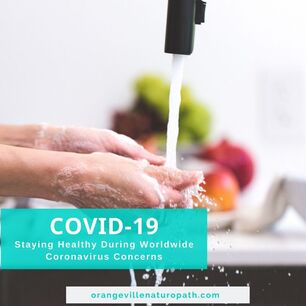How to Stay Healthy During the Coronavirus OutbreakIt's hard to turn on the TV, the radio, or look at social media without seeing some reference to the Coronavirus (COVID-19). In speaking with many of you, no one seems overly alarmed; however I'm noticing that some people are talking precautions like opting for driving vacations instead of flying, and we've heard about the difficulty in obtaining hand sanitizer at some stores. Let's break things down a bit and talk about some ways to boost your immune system, regardless of the risks.
What is COVID-19?
It is the most recently discovered Coronavirus, belonging to a large family of viruses affecting both humans and animals, that was first reported in China December 2019. Well-known forms of the virus are MERS and SARS, but it can also present as a cold. The virus is currently spreading worldwide.
What are the symptoms of COVID-19?
- fever
- fatigue
- dry cough
- aches & pains
- congestion or runny nose
- sore throat
- difficulty breathing may develop
The illness is generally mild, but older individuals and people with certain medical conditions (high blood pressure, diabetes, lung disease, heart disease, cancer) seem to be more susceptible to serious illness. Collecting accurate data on infection rates is a challenge. Anyone with difficulty breathing should seek medical attention.
This information is being updated regularly by the World Health Organization, but it is thought that respiratory droplets shared by coughing is the main route of transmission. This is the reason that hand washing is so highly recommended at this time (and all the time). It can take 2-14 days for symptoms to show after catching the virus.
To Avoid Exposure:
- Limit time spent in large crowds or places with poor ventilation
- Masks don't seem to show any benefit at this time
- Wash your hands regularly, especially before eating or touching your face
Do you wash your hands properly? You can watch a video on hand-washing here - Stay home if you are sick
To Boost Your Immunity Daily
I've discussed these strategies before in previous blog posts, but let's review them once again.
- Rest
- listen to your body if you are run down
- maintain regular sleep schedule - Eat a health promoting diet
- lots of veggies, quality proteins, healthy fats
- limit sugar & processed foods that lower the immune response
- consume homemade bone broth soups - Be active, especially outdoors
- fresh air (not indoor recycled air that is of poorer quality) every day to clear the lungs
- move lymphatic fluid around the body - Stay hydrated
- drink as much water or herbal tea as you can
- introduce a cool mist humidifier into your bedroom to keep mucus membranes moist - Find ways to manage your stress levels
- cortisol impacts the immune system - General Immune Support and Antivirals
- Vitamins A, C & D, Zinc
- Echinacea
- Elderberry (the syrup is great for kids)
- Quercetin
** Ask me the best combination and doses for you
If you are planning to fly over the next little while (for work or that amazing March Break vacation you booked months ago), I suggest considering the following preventative measures:
- Bring:
- Vitamin C packets (eg. Ener-C)
- Vitamin A drops
- Probiotics (pack in your suitcase and keep in hotel fridge once you arrive) - Take Vitamin A the day before you fly (10,000IU), repeat during the flight, and the day after you land
- Vitamin A is an antiviral
- Do not take if you are pregnant or trying to conceive (men & women) - Buy a large water bottle once you clear customs and add two packages of Vitamin C powder, drink in the airport and during the flight. Repeat when you land.
- Take 50 billion CFU (1-2 capsules) of probiotics daily while travelling, and finish the bottle when you return
- Other things to consider:
- Airplanes expose us to poor air quality -> Liver Support may be needed
- Vitamin D -> it's best to test your levels first
- Antivirals -> many different blends
**Always ask your health provider what is right for you before taking anything.
Keep in mind, since this coronavirus is entirely new, we don't know how to prevent or treat it. The strategies I mention above are typical immune supportive techniques that have been effective for preventing other viruses but cannot guarantee you will not become ill.
Yours in health,
Dr. Christa
"An ounce of prevention is worth a pound of cure." ~ Benjamin Franklin

 RSS Feed
RSS Feed